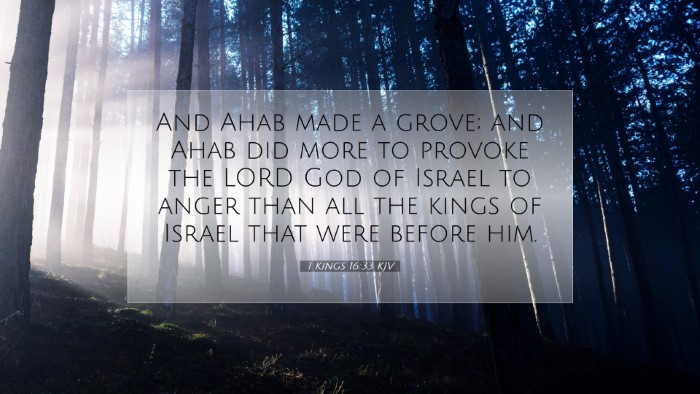Commentary on 1 Kings 16:33
Verse (1 Kings 16:33): "And Ahab made a grove; and Ahab did more to provoke the Lord God of Israel to anger than all the kings of Israel that were before him."
Introduction
This verse serves as a critical juncture in the narrative of the kings of Israel, particularly centering around King Ahab, one of the most notorious figures in Israelite history. The phrase "did more to provoke the Lord God of Israel to anger" emphasizes Ahab's significant role in the spiritual decline of Israel, acting as a precursor to the eventual judgment that would befall the nation.
Ahab's Promotion of Idolatry
1. The Grove: Ahab's construction of a grove was not merely a physical structure; it represented a heightened level of idolatry. Historically, groves were sacred places where various pagan deities were worshiped. This act directly transgressed the commands given to Israel, which expressly forbade such practices (Deuteronomy 12:3).
2. Comparison to Previous Kings: The text makes a stark comparison, stating that Ahab provoked God to anger "more than all the kings of Israel that were before him." This underscores Ahab's notorious reputation and implies that previous kings had already led Israel into sin, but Ahab escalated this rebellion against the Lord.
- Matthew Henry: Henry notes that Ahab's actions reflect not only personal sin but also the influence of his marriage to Jezebel, who championed Baal worship. This marriage represents a tragic partnership where political alliances corrupted spiritual fidelity.
- Albert Barnes: Barnes expounds on Ahab's influence, indicating Ahab's combination of political ambition and idolatrous practices set a precedent that would lead to further moral and spiritual decline among the Israelites.
- Adam Clarke: Clarke emphasizes that Ahab's culpability is compounded by the knowledge he possessed of God’s covenant with Israel. His blatant rebellion was not out of ignorance but rather a deliberate choice against divine commandments.
Theological Implications
Ahab's actions illustrate the profound consequences of idolatry, not only on a national level but also on the individual hearts of the people. Several theological insights emerge from this wrathful engagement of God:
- God's Holiness: The anger of God towards Ahab serves as a reminder of divine holiness. God cannot and will not tolerate rebellion against His commands. This principle resonates throughout Scripture and teaches modern readers about God's unchanging nature.
- The Dangers of Leadership: Ahab's story is a cautionary tale regarding leaders and their influence. The weight of leadership carries the responsibility of guiding others either towards God or away from Him. Ahab's example illustrates how leaders can lead their people into spiritual ruin.
- National Judgment: The actions of a single king had ramifications for an entire nation, indicating that national sin can provoke God's judgment. Ahab’s disobedience starkly mirrors the corporate nature of sin in Israel and its consequences, urging contemporary audiences to heed the warnings of collective straying from God.
Applications for Today
For pastors, students, theologians, and Bible scholars, this passage serves as a crucial reference point in discussions about leadership, idolatry, and God’s holiness. Several applications can be drawn:
- Missional Urgency: Just as God sought to engage with His people through the prophetic voice and calls to repentance, modern believers are also called to engage the world against idolatrous influences—be they cultural, social, or personal.
- Personal Integrity in Faith: Followers of Christ must regularly examine their own lives for ‘groves’—those areas where spiritual compromise may be present. This verse challenges believers to fully embrace God's commands and avoid any form of idolatry.
- Church Leadership: Those in positions of leadership within the church must recognize their influence. Ahab’s negative example serves as a prompt for leaders today to guide their congregations faithfully, ensuring that they steer clear of practices that provoke God.
Conclusion
In 1 Kings 16:33, the portrait of Ahab reveals a profound warning concerning idolatry, leadership, and the nature of God. As history replays through the cycles of leadership and faith, Ahab stands as a symbol for the pitfalls of turning away from God. Learning from his legacy is essential for believers aiming to navigate the complexities of their faith and the challenges of leadership in a contemporary world.


